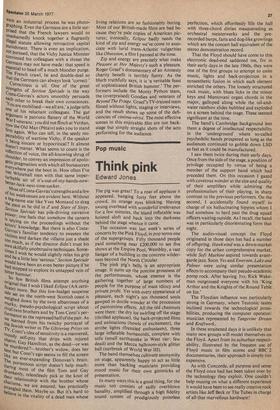Pop music
Think pink
Edward Jones
The pig was great! To a roar of applause it appeared, hanging forty feet above the crowd, its orange eyes blinking. Having swung overhead with wonderful irrelevance for a few minutes, the bland inflatable was hoisted aloft and back into the darkness behind the stage whence it came.
The occasion was last week's series of concerts by the Pink Floyd, in pop terms one of the supergroups. Fifty thousand people paid something near £200,000 to see five shows at the Empire Pool, Wembley, a vast hangar of a building in the concrete wilderness beyond the North Circular.
The pink pig's belly is an appropriate image. It sums up the porcine grossness of the performances, whose essence is the gathering together of large numbers of people for the purpose of mass idiocy and private profit. Yet with every appearance of pleasure, each night's ten thousand souls gawped in docile wonder at the procession of pantomime effects. All the old chestnuts were there: the dry ice swirling off the stage (thrilled applause), the back-projected films and animations (howls of excitement), the strobe lights (frenzied enthusiasm), three large inflatable humanoids; complete with sofa (small earthquake in West tier: few dead) and the Mecca ballroom-style glitter ball (outbreak of World War III).
The band themselves cultivate anonymity on stage, apparently happy to act as little more than backing musicians providing mood music for their own gimmicks of presentation.
In many ways this is a good thing, for the music too consists of sadly overblown banality, amplified through a high fidelity sound system of prodigiously pointless
perfection, which effortlessly fills the hall with three-chord ditties masquerading as orchestral meisterwerks and the pre recorded burps, farts and dog-like growlings which are the concert hall equivalent of the stereo demonstration record.
That the Floyd should have come to this electronic dead-end saddened me, for in their early days in the late 1960s, they were one of the first groups to attempt to unite music, lights and back-projection in a synaesthetic fusion in which each element enriched the others. The loosely structured rock music, with blues licks in the minor keys and Mantovani organ chords in the major, galloped along while the oil-andwater rainbow slides bubbled and exploded on a screen behind the stage. These seemed significant at the time.
The band's Cambridge background lent them a degree of intellectual respectability in the 'underground' where so-called psychedelic bands prospered as long as the audiences continued to gobble down LSD as fast as it could be manufactured.
I saw them twice during their early days. Once from the side of the stage, a position of privilege occupied by virtue of being a member of the support band which had preceded them. On this occasion I gazed with covetous wonder at the size and quality of their amplifiers while admiring the professionalism of their playing, in sharp contrast to the previous performers. On the second. I accidentally found myself in charge of six hallucinating hippies whom I had somehow to herd past the drug squad officers waiting outside. As I recall, the band was in particularly disorientating form that night.
The audio-visual concept the Floyd originated in those days has had a number
of offspring. Hawk wind was a down-market copy for the urban comprehensive market, while Soft Machine aspired towards avantgarde jazz. Soon Yes and Emerson, Lake and Palmer were using similar presentation effects to accompany their pseudo-academic pomp rock. After leaving Yes, Rick Wakeman outgrossed everyone with his 'King Arthur and the Knights of the Round Table on Ice.'
The Floydian influence was particularly strong in Germany, where Teutonic tastes inclined towards the technological possi
bilities, producing the computer operator/ musician represented by Tangerine Dream and Kraft werk, In these straitened days it is unlikely that many new groups will model themselves on
the Floyd. Apart from its suburban respectability, illustrated by the frequent use of Floyd music in film scores and BBC 2 documentaries, their approach is simply too expensive.
As with Concorde, all purpose and sense the Floyd once had has been taken over by the technology they exploit. One couldn't help musing on what a different experience it would have been to see really creative rock artists like Jeff Beck or The Tubes in charge of all that marvellous hardware!


































 Previous page
Previous page